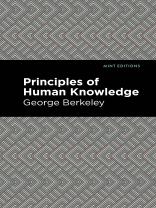An exploration and defense of immaterialism, Principles of Human Knowledge, details George Berkley’s views on reality and perception. The book offers insight into the theory posited by one of the world’s greatest philosophers.
Principles of Human Knowledge, is a criticism of English philosopher John Locke and his beliefs surrounding conceptualism and realism. Berkley’s theory of immaterialism is in direct opposition, stating that material objects are rooted in perceived ideas. There is an area of non-reality that cannot be touched or captured.
A critical exploration of opposing views, Principles of Human Knowledge is a foundational text that still applies in modern philosophy. It examines the realist argument in relation to both the secular and spiritual realm.
With an eye-catching new cover, and professionally typeset manuscript, this edition of Principles of Human Knowledge is both modern and readable.
Since our inception in 2020, Mint Editions has kept sustainability and innovation at the forefront of our mission. Each and every Mint Edition title gets a fresh, professionally typeset manuscript and a dazzling new cover, all while maintaining the integrity of the original book.
With thousands of titles in our collection, we aim to spotlight diverse public domain works to help them find modern audiences. Mint Editions celebrates a breadth of literary works, curated from both canonical and overlooked classics from writers around the globe.
Mengenai Pengarang
George Berkley (1685–1753) was an Irish philosopher who thrived during the 18th century’s Age of Enlightenment. Born in Ireland and educated at Kilkenny College and Trinity College, he earned both a bachelor’s and master’s degree before entering a career as a lecturer. Berkley’s first notable work as a writer was An Essay Towards a New Theory of Vision published in 1709. Yet, his biggest successes came with A Treatise Concerning the Principles of Human Knowledge followed by Three Dialogues between Hylas and Philonous. Berkley’s best known for his Theory of Immaterialism and contributions to the British Empiricism movement.












